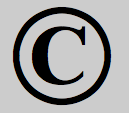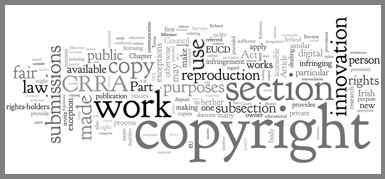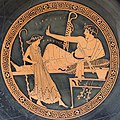Data Protection for the 21st Century: The EU Reform Proposals
February 22nd, 2012
Timothy Pitt-Payne QC and Robin Hopkins spoke at the 11KBW Information law seminar; Data Protection for the 21st Century: The EU Reform Proposals on 21st February 2012. The papers from this seminar are now available to download – click here
Author: Eoin
#CRC12 Paper: Chapter 2 – The Intersection of Innovation and Copyright in the Submissions
 The main focus of the Terms of Reference of the Copyright Review Committee is upon the barriers to innovation, if any, created by Irish copyright law; and this was reflected in the submissions which the Committee received (update: you can download a pdf of the Paper here (via DJEI) or here (from this site)). After an introductory chapter 1, chapter 2 of the Copyright Review Committee’s Consultation Paper (published yesterday) sets out what the Committee understood by innovation (section 2.2), it briefly outlined some salient features of Irish copyright law (section 2.3), and the points in the previous two sections were applied to a classification of the submissions received (section 2.4).
The main focus of the Terms of Reference of the Copyright Review Committee is upon the barriers to innovation, if any, created by Irish copyright law; and this was reflected in the submissions which the Committee received (update: you can download a pdf of the Paper here (via DJEI) or here (from this site)). After an introductory chapter 1, chapter 2 of the Copyright Review Committee’s Consultation Paper (published yesterday) sets out what the Committee understood by innovation (section 2.2), it briefly outlined some salient features of Irish copyright law (section 2.3), and the points in the previous two sections were applied to a classification of the submissions received (section 2.4).
In the Paper, the Committee construe “innovation” and its connections with copyright fairly broadly. Whilst the Committee has regard to innovation, creativity, ingenuity, renewal and transformation in all of their forms – artistic, cultural, educational and social, as well as economic – nevertheless, much public policy is now being driven by “innovation” in the sense of the development of new businesses, products and technologies. For example, the Organisation of Economic Co-Operation and Development (OECD) understands the process of innovation (pdf)
…as the implementation of a new or significantly improved product (good or service), or process, a new marketing method, or a new organisational method in business practices, work-place organisation or external relations … [which must therefore] by definition, contain a degree of novelty.
Why #CRC12 is not #sopaIreland
 In the press release announcing the publication of the Copyright Review Committee Consultation Paper mentioned in my previous post (and which I hope will be discussed on twitter at the hashtag #CRC12), the Minister also announced the signing into law of the European Union (Copyright and Related Rights) Regulations 2012 (SI No 59 of 2012). This Statutory Instrument (SI) relates to the availability of injunctions by rights-holders against intermediaries to prevent copyright infringement by the intermediaries’ customers (which has the twitter hashtag #sopaIreland). I cannot stress enough that this issue is separate and distinct from the work of the Committee, and is not dealt with in the Paper. In other words, as the title to this post says, #CRC12 is not #sopaireland. Much has been written already about the SI when it was in draft form; and doubtless more will be said now that it has been brought into force. However, it was not within the remit of the Committee, and I hope the parallel publication of the SI and the Paper does not detract from the issues canvassed in our Paper (update: you can download a pdf of the Paper here (via DJEI) or here (from this site)).…
In the press release announcing the publication of the Copyright Review Committee Consultation Paper mentioned in my previous post (and which I hope will be discussed on twitter at the hashtag #CRC12), the Minister also announced the signing into law of the European Union (Copyright and Related Rights) Regulations 2012 (SI No 59 of 2012). This Statutory Instrument (SI) relates to the availability of injunctions by rights-holders against intermediaries to prevent copyright infringement by the intermediaries’ customers (which has the twitter hashtag #sopaIreland). I cannot stress enough that this issue is separate and distinct from the work of the Committee, and is not dealt with in the Paper. In other words, as the title to this post says, #CRC12 is not #sopaireland. Much has been written already about the SI when it was in draft form; and doubtless more will be said now that it has been brought into force. However, it was not within the remit of the Committee, and I hope the parallel publication of the SI and the Paper does not detract from the issues canvassed in our Paper (update: you can download a pdf of the Paper here (via DJEI) or here (from this site)).…
Copyright and Innovation – The CRC Consultation Paper
 |
As regular readers of this blog will know, last Summer, to maximise the potential of digital industry in Ireland, the Minister for Jobs, Enterprise and Innovation, Richard Bruton TD, set up the Copyright Review Committee to identify any areas of Irish copyright legislation that might create barriers to innovation and to make recommendations to resolve any problems identified. Our Consultation Paper has just been published on the the Department’s website (and it’s also available for download here (pdf)). Welcoming the Paper, the Minister of State with responsibility for Research and Innovation at the Department of Enterprise, Jobs and Innovation, Seán Sherlock TD, said
I am committed to reviewing and updating the Copyright legislation currently in place in order to strike the correct balance between encouraging innovation and protecting creativity. This paper has been prepared by the Copyright Review Committee in response to submissions received and public engagement. I urge all interested parties, including information providers and ISPs, innovators, rights holders, consumers and end-users, to study it carefully and engage in a constructive debate on all the issues.
As to what is in the Paper, the wordle above gives a good sense of the frequency with which various words are used in it.…
McMahon on Judging
 I spent a lot of today at the Law Student Colloquium which I mentioned in my previous post; and it was a great deal of fun. The day culminated with the First Annual Brian Lenihan Memorial Address, delivered by former academic and retired judge Bryan McMahon (above left), on the topic of
I spent a lot of today at the Law Student Colloquium which I mentioned in my previous post; and it was a great deal of fun. The day culminated with the First Annual Brian Lenihan Memorial Address, delivered by former academic and retired judge Bryan McMahon (above left), on the topic of
Judging.
He told us that a judge has a front row seat in the theatre of life; and, in his characteristically erudite and witty speech (citing all the great legal philosophers, including Groucho Marx, Maurice Chevalier, and Joe Duffy), he gave a wonderful review of the dramas, comedies and tragedies that have played out in his courtrooms. It was, he said, all very different from the jurisprudence of judging with which he was concerned as an academic, and yet he brought all his academic rigour to bear on the analysis of his twelve years on the bench, during which he said he sat in every county in Ireland.
The heart of his discourse was a discussion of judicial attributes. The essential traits include courtesy, patience, knowledge of the law, the ability to listen, the ability to make a decision, and the ability to give reasons for those decisions.…
1709 Blog Red Bus seminar: early announcement
The recent decision of Judge Colin Birss QC in Temple Island Collections Ltd v New English Teas Ltd & another [2012] EWPCC 1 has attracted a good deal of attention on the blogosphere and beyond in the way in which it has approached the scope of copyright protection which the creator of a photograph or digitally manipulated image might now expect to enjoy in the courts of England and Wales. Andy Johnstone authored a guest-note on this weblog here, while Catherine Lee provided this analysis for the IPKat and Rosie Burbidge has since posted her view of the ruling on Art & Artifice. Further comments come from ACID, NIPCLAW and beyond.
Nothing to fear from debating with extremists | Irish Examiner
Nothing to fear from debating with extremists
Friday, January 27, 2012
Rather than ban the debate or protest outside the venue, it is our duty to engage and challenge the likes of Nick Griffin, writes Emmanuelle Schön-Quinlivan …
I do not believe freedom of speech was at the heart of this dilemma. However, freedom of rebuttal was. Those who opposed Griffin’s talk aimed to impose their view of democracy to other staff and students, a view which does not allow certain elected representatives to be challenged systematically, coherently and calmly as they express extremist views. …
Debating will make no difference to staunch supporters on either side. But for those of us who sit quietly in the corner, who voted for another party in a previous election but were disillusioned and consider a bold move to a more radical party, debate is crucial.
Great op-ed by: Dr. Emmanuelle Schon-Quinlivan of UCC.
See also the Editorial in the same edition: Griffin ban – Free speech is important.
Law Student Colloquium and Brian Lenihan Memorial Address
 The fourth annual Law Student Colloquium will take place in the Graduates’ Memorial Building (map) and the Law School (map) Trinity College Dublin, on Saturday 4 February 2012.
The fourth annual Law Student Colloquium will take place in the Graduates’ Memorial Building (map) and the Law School (map) Trinity College Dublin, on Saturday 4 February 2012.
The Colloquium is organised by law students for law students; it has been an enormous success over the past three years; and it has been made possible by the kind sponsorship of Allen & Overy and William Fry. For all enquiries please contact the organisers by email.
The centrepiece of the Colloquium will be the First Annual Brian Lenihan Memorial Address, which will take place at 6pm in the Graduates’ Memorial Building that evening. The Address has been organized by the Colloquium committee in order to mark Mr Lenihan’s substantial contribution to Irish public life, his longstanding connection to the Law School as a student, scholar, and lecturer, and his recent tragic death. It is envisaged that this will be the keynote event of the Colloquium from this year on.
This year’s Address is to be delivered by Judge Bryan McMahon, recently retired from the Irish High Court. The title of the address is ‘Judging‘ and in it Judge McMahon will discuss the craft of judging as well as the role of the judge in a modern democracy, and share with his audience insights accumulated during a varied career as an academic, practitioner, and judge.…

